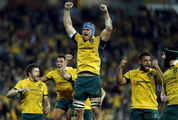IN OCTOBER last year, that irrepressible magazine, Noseweek, ran a shocking allegation: "Sidney Frankel is a paedophile." Most people knew Frankel as the scion of a long-standing Johannesburg stockbroking family, a man of enormous wealth and influence and even generosity.
As one biography summed it up: "A noted philanthropist in SA, he was recently CEO of Société Générale Frankel Pollak and is chairman of Frankel Consulting. His nonprofit work includes the establishment of the Buffelshoek Trust, which seeks to build schools, clinics and preschools in Limpopo."
He was the host to the weekend of fly-fishing during the constitutional negotiations when Cyril Ramaphosa removed a hook from Roelf Meyer’s hand. He hosted Nelson Mandela at the JSE in 1990, bringing trading to a rare and brief halt.
Noseweek (whose circulation, intriguingly, is now competing with the likes of Business Day) had a different take, laying out the testimony of a group of victims who had come forward "to confront the man who sexually molested them as young children".
In sworn statements, they gave graphic details of him using children’s bath times, tennis games and love of horses to mess with them over a 12-to 15-year period during the 1970s and 1980s. Some came from the orphanage where Frankel was a patron. One told of how he had apologised to one of his victims some years ago, "claiming it was part of his own therapy". Many told of how they were dealing with the trauma.
I awaited the media response. It was possible that Noseweek editor Martin Welz had over-reached himself, and then the rest of the media would love the story of him being sued for everything he had. Welz has shown himself to be no fan of Frankel. Alternatively, the Frankel allegations would be splashed across all our front pages and screens.
Neither happened. Bruce Whitfield of Radio 702 and Cape Talk 567 apparently dealt with it on air — the only follow-up I could find.
There was only one conclusion to be reached: our media were still leaning over backwards to protect the rich and powerful, even when faced with the most appalling, detailed and unchallenged allegations. One might have expected a rethink in the light of recent high-profile cases that have raised questions about how men of influence seem to be able to avoid justice for so long and keep these things out of the media.
One-time tennis star Bob Hewitt was convicted and sentenced recently for sexual offences he committed a long time ago. The BBC has been shaken in recent years by how it apparently ignored evidence for decades of Jimmy Saville’s abuse of young girls. Our own government has prioritised cases of sexual violence and abuse, and these issues are frequent topics for lofty and righteous editorials. But none of this seems to have changed the fact that some people seem to enjoy immunity.
I don’t know if the allegations against Frankel are true or false, but I do know that we have an obligation to investigate and report them, especially if no attempt has been made to counter the Noseweek story. At the very least, Frankel has a case to answer.
Welz tells me the only response he has had to his story is that more victims have come forward to speak about it. They turned to the magazine when they were told by a lawyer that too much time had passed for criminal charges to be pursued. They are, however, preparing a civil action against Frankel.
Some might argue that this happened a long time ago, that Frankel has not had his day in court and the story becomes reportable only when the legal process is under way. But isn’t it interesting that these rules seem to apply only to those with wealth, power and influence?
• Harber is the Caxton professor of journalism at Wits University





















Post a comment